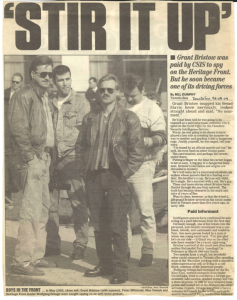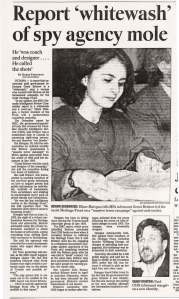This note was originally posted in October 2016 on the Facebook wall of ‘Scoala nr. 19’ – the Bucharest elementary school I attended between ages 6-11.
This spring the nightmares came back. Hardly a month goes by without a flashback, but after my mother died in December 2015, everything that happened to me in Romania intensified. The last 30 years of my life have been a nightmare, and much of it stems from what happened to me in Bucharest, at Scoala Nr. 19.
I write this note in English because it’s the language I’ve spoken for the last 30 years. My parents are both dead, and I don’t have any Romanian friends in Toronto, Canada, where I emigrated at age 11 before the 1989 Romanian Revolution that toppled dictator Nicolae Ceausescu. I feel awkward expressing my emotions in Romanian, but the scars of what happened to me at Scoala nr. 19 still haven’t faded. Pain doesn’t fade with time. Sexual exploitation has consequences, especially at a fragile, tender age.
I was 9 years old when my mother defected from communist Romania, four years before Ceausescu’s regime was defeated. My father was 68 years old and didn’t want a child; his long-time affair with his mistress was all that he cared about. I was nine years old when my father began to lock me out of our apartment on Magheru Boulevard, and when I realized for the first time that nobody cared if I lived or died.
At nine years old I was skinny, always hungry, and most of all – afraid. The boys at my school started to pick on me – none worse than Marc Faur, the gang leader of a posse of boys who made my life miserable. He sensed who the most vulnerable, defenceless kids were in our school and honed in on me.
Those boys attacked me before and after school – kicked me, grabbed at my breasts, and Marc always made sure to punch me in the stomach with as much power and force as he could muster. They stole my innocence and at only ten years old, they made me feel that I was worthless, garbage and should kill myself.
Marc Faur hit me almost every day, making me feel dirty and afraid because nobody else tried to defend me. I know what it’s like to double over in pain, gasping – choked out of breath, feeling as worthless as a cockroach. Feeling that nobody gives a shit about me, that anybody can do whatever they want to me with impunity. I was alone, and Marc – well, Marc was the Pioneer President of Class E. His mother was a renowned opera singer, while my own parents were deaf. Worthless.
After my mother defected on a trip to Italy in 1985, my father and me were labeled political traitors. No teachers gave a shit about me.
The teachers knew better than to pick on Faur, and consequently he became our class bully. Marc Faur was a big, overweight boy and I was scrawny and unloved. Nobody cared how much I cried behind the school gymnasium, how hungry I was because nobody had packed a lunch for me.
Our teacher, Tovarasa Elena Hlatcu, sent notes to my father that my hair wasn’t brushed and I hadn’t washed my face. She sent notes after my period started, saying that “Someone should make sure the child is clean and doesn’t smell so awful.”
My father didn’t give a shit. I lived on the streets most of the time, fending off pedophiles, depending on my best friend’s family to feed me. I was a proud girl and never asked for food, but I didn’t turn away any sandwiches or leftovers, either. Marc and Silviu Constantin abused me in every way possible – kicking me, spitting on me, grabbing my breasts, punching me in the gut, and Marc Faur went so far as to look for cockroaches and drop them in my hair.
Marc wrote horrible things on the blackboard, calling me a whore, and (as always) punched me in the stomach and in the breasts, with as much force as he could. Others, like Dan Popescu didn’t care about my abuse; they were too delicate to hit me themselves, so they looked the other way. Even as boys teased, hit and abused me, Dan (who was the only boy I ever had a crush on) looked the other way.
To this day, I am terrified of bugs. I relieve what Marc did every moment I step into the shower and wash my hair.
To this day, often I look in the mirror I am embarrassed by the size of my breasts. Silviu and Faur did this – they made me feel like garbage. They assaulted me while (at only ten and eleven years old) I felt too worthless and ashamed to tell our teacher or my father, who probably would have beaten me for causing trouble.
Thirty years have passed. I am forty years old, but the trauma those boys caused me was worse than a sexual assault – it has permeated every pore of my being. It made me feel ugly and unloved. It made me feel disgusted with my own body, which I felt had betrayed me. As a teenager, I started picking, cutting at my skin; I hated every bit of me. I was as worthless as they made me feel – even worse.
The trauma that I experienced at Scoala Nr. 19 is still part of my daily life. To this day, nobody has apologized for destroying my innocence and causing me the nightmares that still return today. Nobody has apologized for making me feel ashamed of my body, for the disgusting words I still hear inside my head today.
But I have nothing left to lose – and I’m no longer willing to remain ashamed and feel worthless just to cover up what those boys did to me. They physically and sexually abused me. They raped my innocence, and I don’t owe them anything.
I refuse to be silent anymore.
Writing this post is part of empowering myself again – reclaiming the power that they stole from me.
Postscript: after I came forward with the truth about what happened to me, on Oct. 27 I received an “apology” via email from the bully ringleader of the abuse, Marc Faur, saying he was sorry for “not being nice” to me.
“Not nice” meant beating me during recess, among other things.
I rejected the apology because it wasn’t genuine and decided to write openly about it and post about it on his Facebook page this past week.
For the last 48 hours I’ve received hate-filled messages from his friends in Romania, telling me to “Go fuck yourself”, “you’re deranged”, and calling me terrible insults and names. This is without them knowing any evidence.
THIS is the reason women and girls don’t report abuse.
Soon they enlisted Facebook friends to attack me – friends who weren’t even Romanian and had no clue about what happened in the 1980s. Foreign friends who simply wanted justification to attack a stranger.
In the last 48 hours I also received messages asking me to excuse the actions of 11-year old boys. But none of those requests acknowledged the trauma caused to a 10-year old girl. Just because this happened decades ago does not lower the impact, the pain, the consequences of their abuse on my life.
Why are girls considered worthless compared to boys?
Why is my trauma considered worthless?

Former classmate Costin Craioveanu writes on Marc Faur’s Facebook wall: “I remember her…a superb being…it was impossible not to abuse her.”
This is pathetic – it’s bullying, and it’s NOT right. Abuse does NOT have an expiration date.
December 4 update: Other women have approached me with memories of being assaulted by boys at my old school. A model whose photos are pictured on Faur’s Photography page also contacted me privately. Another woman spoke about being raped by a boy from School no. 19, but from a different graduating year.
Last night I also spoke with an old classmate who was also beaten and abused by Marc Faur and shared the effects it had on her life. I hid her identity to protect her privacy and ensure she won’t suffer the abuse I’ve received over the last week. However, her story is important and needs to be heard. Her account is written in Romanian, but states that she was repeatedly emotionally and physically abused by Marc Faur.
We are not alone!


























